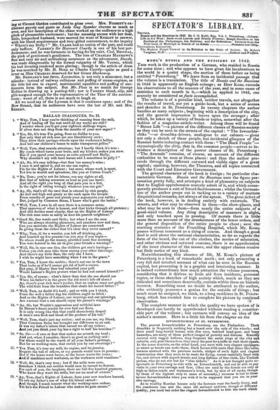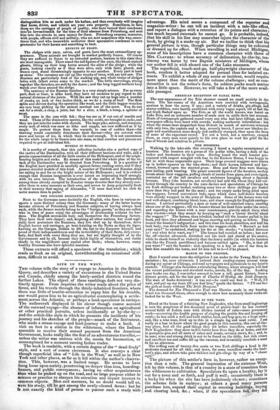SPECTATOR'S LIBRARY.
Tweezes.
Russia and the Russians in 1842. By J. G. Kohl, Esq. Vol. I. Petersburg...Colbent. Life in ttse West : Back-wood Leaves and Prairie Flowers: Rough Sketches on the Borders of the Picturesque, the Sublime, and the Ridiculous. Extracts from the Note-book of Morleigh in Search of an Estate Sounder; cad °tidy.
KOLOGICAL EDUCATTON.
The Modern Pulpit Viewed in Be Relation to the State of Society. By Robert Vaughan. D.D Alarm sad Walford.
NOEL'S RUSSIA. AND THE RUSSIANS IN 1842.
Tins work is the production of a German, who resided in Russia for some time ; and who appears to have given his lucubrations to the world in a quaint shape, the section of them before us being entitled "Petersburg." We learn from an incidental passage that the volume is a translation. The title of Russia and the Russians in 1842 is apparently an English coinage ; as Herr limn. extends his observations to all the seasons of the year, and in some cases of statistics to each month in it,—which as applied to 1842, can scarcely be considered as facts accomplished.
The volume is of a peculiar kind, neither travels, nor altogether the results of travel, nor yet a guide-book, but a series of scenes and sketches in St. Petersburg. In twenty chapters the author handles as many subjects ; beginning with a description of the city, and the general impression it leaves upon the stranger after which, he takes up a variety of heads or topics, somewhat after the fashion of a magazine-article-writer. Among these will be found "Street Life "—a picture of the different classes of Russian society, as they can be seen in the streets of the capital : "The Iswoschts- chiks "—or droschka-drivers, analogous to our cabmen — gives not only a sketch of these people, but incidental glimpses of the Russian habits inducing contact with them : "The Black People "- etymologically the dirty, that is, the common people—serves to in- troduce a description of the poorer classes of St. Petersburg : "The Arsenals" contains, of course, an account of the different curiosities to be seen at those places : and thus the author pro- ceeds through the different outward and visible signs of a great capital ; omitting, however, the Theatres, and all topics connected with the Court and Executive Government.
The general character of the book is foreign ; its particular cha- racteristic German. Russia and the Russians uses the figure per- sonation pretty fully, and attempts a kind of pleasantry on subjects that to English apprehension scarcely admit of it, and which conse- quently produces a sort of forced facetiousness ; whilst the German- ism of the author peeps out in tacking on to a variety of matters disquisitional remarks, not always of the aptest. The great defect of the book, however, is in dealing entirely with externals. The streets, and what may be observed in them—the show-places, and what may be seen in them—form nearly the entire subjects of a good-sized volume. Any thing descriptive of manners is slight, and only touched upon in passing. Of morals there is little more than an account of the drunkenness of the lower orders, and the general disposition of the entire people to cheat ; save the startling statistics of the Foundling Hospital, which Mr. Ewa, passes without comment as a thing of course. And though a good deal is said about the national characteristics, so far as regards the form of the beard, the cut of the clothes, the modes of salutation, and other obvious and outward customs, there is no apprehension of the inner character of the masses, and the upper classes receive but little notice of any kind. Notwithstanding this absence of life, M. KOHL'S picture ot Petersburg is a book of remarkable merit ; not only presenting a very full and detailed account of what can be seen in the Russian capital, but presenting it in a graphic and interesting manner. It is indeed extraordinary how much attraction the volume possesses, considering that it derives so little aid from incidents, personal topics, or those sketches of high society which, much as they are ridiculed and sometimes deservedly, contain within them an historic interest. Something must no doubt be attributed to the author, who evidently possesses a genius for the outside of things ; but much must be assigned, we think, to along residence in St. Peters- burg, which has enabled him to complete his picture by cliinual observation.
The complete manner in which the quality we have spoken of is developed can hardly be apprehended without reading a consider- able part of the volume ; but extracts will convey an idea of the author's manner. Here is a little bit from the chapter on the
ISHOSCHTSCHHIS OF ST. PETERSBURG.
The poorest Iswoschtschiks in Petersburg are the Philanders. Their droschka is frequently nothing but a board over the axle of the wheels ; and their small long-haired horses, with dim eyes, botched head-gear, and bony haunches, are many of them perfect images of poverty and distress. Scantily covered with ragged kaftans, they frequent the outer rings of the city and suburbs, and, poor themselves, they carry the poor for &trifle to visit their equals. In the inner districts, on the other hand, you meet with very elegant equipages, as smart as hands can make them, black horses with coats that shine like satin, harness adorned with the precious metals, sledges of such light and elegant construction that they seem to be made for flying, covers tastefully lined with fur, and drivers with superb beards and long kaftans of fine cloth, like Turkish pashas, who do not stir but for "blue tickets." As it is not thought quite re- spectable in Petersburg to ride with an Iswoschtschik, and not be able to pay visits in your own carriage and four, (they are used by the female sex only as high as ladies-maids and tradesmen's wives, but by men of all ranks, though by those of the highest only in cases of necessity,) recourse is had to thew spruce Iswoschtschiks when you wish it to be supposed that
you are in your own carriage. As in wealthy Russian houses only the footmen wear the family livery, and the coachmen one and the same old national uniform, though of different quality, you need but order the elegant Iswoschtsohik to hide the mark which distinguishes him as such under his kaftan, and then everybody will imagine that horse, driver, and vehicle are your own property. Sometimes, in fact, these are the carriages of people of quality, who have turned their coachman haulm Iswoschtschik for the time of their absence from Petersburg, and sent him into the streets to earn money for them. Petersburg swarms, moreover, with people, officers civil and military, who are sent sometimes this way,some- times that, and who meanwhile authorize their speculative coachman to earn provender for their horses and something to boot.
EFFECTS OF FROST.
The sledges with oxen, calves, and goats, have the most extraordinary ap- pearance. These animals are brought to market perfectly frozen. Of course they are suffered to freeze in an extended posture, because in this state they are most manageable. There stand the tall figures of the oxen, like blood-stained ghosts, lifting up their long horns around the sides of the sledge; while the goats, looking exactly as if they were alive, only with faint, glazed, and frozen eyes, stand threateningly opposite to one another. Every part is hard as stone. The carcasses are cut up like trunks of trees, with axe and saw. The Rusians are particularly fond of the sucking-pig, and whole trains of sledges laden with infant swine come to the market. The little starvelings, strung together like thrushes, are sold by the dozen ; and the long-legged mothers keep watch over them around the sledge. The anatomy of the Russian butcher is a very simple science. For as every part, flesh or s alike hard, they have no occasion to pay regard to the natural divisions Of the joints. With the saw they cut up hogs into a number of steaks an inch or two inches thick, as we do a rump of beef. The flesh splits and shivers during the operation like wood, and the little beggar-wenches are very busy picking up the animal sawdust out of the snow. You do not ask for a steak, a chop, a joint, but for a slice, a block, a lump, a splinter of meat.
The same is the case with fish : they too are as if cut out of marble and wood. Those of the diminutive species, like the anftki, are brought in sacks, and they are put into the scales with shovels. The large pike, salmon, and sturgeon, every inch of which was once so lithe and supple, are now stiffened as if by magic. To protect them from the warmth, in case of sudden thaw—for thawing would essentially deteriorate their flavour—they are covered with snow and lumps of ice, in which they lie cool enough. It is not uncommon for the whole cargo to be frozen into one mass, so that crowbar and pincers are required to get at individual fish.
MODELS TN RUSSIA.
It is worthy of remark, that this collection includes also a perfect copy of the castles of the Dardanelles, with all their different bastions and walls, and a precise representation of all the little creeks of the Hellespont, and of the neigh- bouring heights and rocks. By means of this model the whole plan of the at- tack of the Dardanelles may be directed from Petersburg. It is a question if the English have provided so carefully against future contingencies, and if they possess detailed models of this kind. A number of Turkish and Russian ships are sailing to and fro on the bright mirror of the Hellespont ; and it is evident enough that Russian imagination is ever intent on impressing itself strongly with its own interest. The introduction of the castles of the Dardanelles among those already occupied by Russian troops denotes that they already con- sider them in some measure as their own, and serves to keep perpetually fresh in their memory that saying of Alexander, " 11 nous faut avoir les clefs de noire maison dans la poche.
THE ENGLISH RESIDENTS AT ST. PETERSBCRG.
Next to the Germans come decidedly the English, who form in various re- spects a more distinct colony than the Germans ; many of the latter having become citizens of Petersburg and Russian subjects, or having always been such, while the former merely belong to the "foreign guests," as they are called, who in time of peace enjoy the advantages of denizenship without its bur- dens. The English mercantile body call themselves the Petersburg factory. They have their own chapel; and, despising all other nations, but most espe- daily their protectors the Russians, they live shut up by themselves, drive English horses and carriages, go bear-hunting on the Newa as they do tiger- bunting on the Ganges, disdain to lift the hat to the Emperor himself, and proud of their indispensableness and the invincibility of their fleets, defy every- body, find fault with every thing they see, but are highly thought of by the Government and by all, because they think highly of themselves, and reside chiefly in the magnificent quay named after them; where, however, many wealthy Russians also have splendid manions.
These extracts will afford a specimen of the translation ; which reads as fresh as an original, notwithstanding an occasional stiff- ness, difficult to avoid.



























 Previous page
Previous page